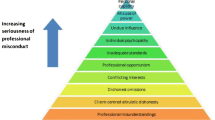Abstract
As a way to advance integration between traditional readings of the medical encounter and argumentation theory, this article conceptualizes the doctor–patient interaction as a form of info-suasive dialogue. Firstly, the article explores the relevance of argumentation in the medical encounter in connection with the process of informed consent. Secondly, it discloses the risks inherent to a lack of reconciliation of the dialectical and rhetorical components in the delivery of the doctor’s advice, as especially resulting from the less than ideal conditions of the internal states of the doctor and the patient, and the lack of symmetry in their status.
Similar content being viewed by others
References
Atkinson, J., and J. Heritage. 1984. Structure of social action. Studies in conversation analysis. Cambridge: Cambridge University Press.
Brashers, D.H. 1999. The patient self-advocacy scale (PSAS): Measuring involvement in health care decision making. Health Communication 11: 97–122.
Brashers, D.H. 2002. Satisfying the argumentative requirements of self advocacy. In Advances in pragma-dialectics, ed. F. H. van Eemeren, 291–308. Newport News, VA: Vale Press.
Brashers, D.H., S. Haas, R. Klingle, and J Neidig. 2000. Collective AIDS activism and individual’s perceived self-advocacy in physician–patient communication. Human Communication Research 26: 372–402.
Brashers, D.H., L.S. Rintamaki, E. Hsieh, and J. Peterson. 2006. Pragma-dialectics and self-advocacy in physician-patient interactions. In Considering pragma-dialectics, ed. P. Houtlosser and A. van Rees, 23–34. Mahwah, NJ: Lawrence Erlbaum Associates.
de Rosis, F., F. Grasso, C. Castelfranchi, and I. Poggi. 2000. Modelling conflict-resolution dialogues. In Computational conflicts, ed. H. Müller and R. Dieng, 41–62. Berlin: Springer.
Dickinson, H. 1998. Evidence-based decision-making: An argumentative approach. International Journal of Medical Informatics 51: 71–81.
Doyal, L.T., ed. 2000. Informed consent in medical research. London: BMJ Publications.
Duggan, A. 2006. Understanding interpersonal communication processes across health contexts: Advances in the last decade and challenges for the next decade. Journal of Health Communication 11: 93–108.
Feteris, E. 1999. Fundamentals of legal argumentation. Dordrecht: Kluwer.
Fox, J., D. Glasspool, and J. Bury. 2001. Quantitative and qualitative approaches to reasoning under uncertainty in medical decision making. In Proceedings of the 8th Conference on Artificial Intelligence in Medicine in Europe (AIME), ed. S. Quaglini, P. Barahona, and S. Andreasson, 272–282. Berlin: Springer-Verlag.
Goodnight, G.T. 2006. When reasons matter most: pragma-dialectics and the problem of informed consent. In Considering pragma-dialectics, ed. P. Houtlosser and A. van Rees, 75–85. Mahwah, NJ: Lawrence Erlbaum Associates.
Grasso, A., A Cawsey, and R Jones. 2000. Dialectical argumentation to solve conflicts in advice giving. A case study in the promotion of healthy nutrition. International Journal of Human-Computer Studies 53: 1077–1115.
Green, N. 2005. A Bayesian network coding scheme for annotating biomedical information presented to genetic counseling clients. Journal of Biomedical Informatics 38: 130–144.
Heritage, J., and D. Maynard. 2006. Communication in medical care: Interactions between primary care physicians and patients. Cambridge: Cambridge University Press.
Jenicek, M., and D. Hitchcock. 2005. Logic and critical thinking in medicine. Chicago, IL: AMA Press.
Ong, L., J. de Haes, A. Hoos, and F. Lammes. 1995. Doctor–patient communication: A review of the literature. Social Science & Medicine 40: 903–918.
Quill, T., and H. Brody. 1996. Physician recommendations and patient autonomy. Finding a balance between physician power and patient choice. Annals of Internal Medicine 125: 736–769.
Roter, D.L., and R. Frankel. 1992. Quantitative and qualitative approaches to the evaluation of the medical dialogue. Social Science and Medicine 34: 1097–1103.
Roter, D., and J. Hall. 1993. Doctors talking to patients/patients talking to doctors: Improving communication in medical visits. Westport, CT: Auburn House.
Roter, D., J. Hall, and N. Katz. 1988. Patient–physician communication: A descriptive summary of the literature. Patient Education and Counseling 12: 99–119.
Rubinelli, S., and P.J. Schulz. 2006. Let me tell you why! When argumentation in doctor–patient interaction makes a difference. Argumentation 20: 353–357.
Sarangi, S., and C. Roberts. 1999. Talk, work and institutional order: Discourse in medical, mediation and management settings. Berlin: Mouton de Gruyter.
Schulz, P.J. 2006. The communication of diagnostic information by doctors to patients in the consultation. In Bordering biomedicine, ed. V. Kalitzkus and P.L. Twohig, 103–118. Amsterdam: Rodopi.
Schulz, P.J., and S. Rubinelli. 2006. Healthy arguments for literacy in health. In Report of the American Association for Artificial Intelligence (AAAI): Spring symposium on argumentation for consumer of healthcare, 86–95. Stanford: AAAI Press.
Stewart, M., J. Brown, J. Boon, L. Galajda, L. Meredith, and M. Sangster. 1999. Evidence on patient–doctor communication. Cancer Prevention and Control 3: 25–30.
Street, R. 2001. Active patients as powerful communicators. In The new handbook of language and social psychology, ed. W. Robinson and H. Giles, 541–560. Chichester, England: Wiley.
Stubbs, M. 1983. Discourse analysis. The sociolinguistic analysis of natural language. Oxford: Basil Blackwell.
Thompson, T. 1994. Interpersonal communication and health care. In Handbook of interpersonal communication, ed. M. Knapp and G. Miller, 696–725. Thousand Oaks, CA: Sage.
Upshur, R., and E. Colak. 2003. Argumentation and evidence. Theoretical Medicine and Bioethics 24: 283–299.
van Eemeren, F.H., and R. Grootendorst. 1992. Argumentation, communication, and fallacies. A pragma-dialectical perspective. Hillsdale, NJ: Lawrence Erlbaum Associates.
van Eemeren, F.H., and R. Grootendorst. 2004. A systematic theory of argumentation. Cambridge: Cambridge University Press.
van Eemeren, F.H., R. Grootendorst, S. Jackson, and S. Jacobs. 1993. Reconstructing argumentative discourse. Tuscaloosa, AL: The University of Alabama Press.
van Eemeren, F.H., R. Grootendorst, and A.F. Snoeck Henkemans. 2002. Argumentation. Analysis, evaluation, presentation. Mahwah, NJ: Lawrence Erlbaum Associates.
van Eemeren, F.H., and P Houtlosser. 1999. Strategic maneuvering in argumentative discourse. Discourse Studies 1: 479–497.
Walton, D.N. 1985. Physician–patient decision making. A study in medical ethics. Westport, CT: Greenwood Press.
Acknowledgment
We wish to thank Bart Garssen for his acute remarks on the earlier version of this paper.
Author information
Authors and Affiliations
Corresponding author
Additional information
An erratum to this article is available at http://dx.doi.org/10.1007/s10503-015-9371-5.
Rights and permissions
About this article
Cite this article
Schulz, P.J., Rubinelli, S. Arguing ‘for’ the Patient: Informed Consent and Strategic Maneuvering in Doctor–Patient Interaction. Argumentation 22, 423–432 (2008). https://doi.org/10.1007/s10503-008-9086-y
Received:
Accepted:
Published:
Issue Date:
DOI: https://doi.org/10.1007/s10503-008-9086-y




